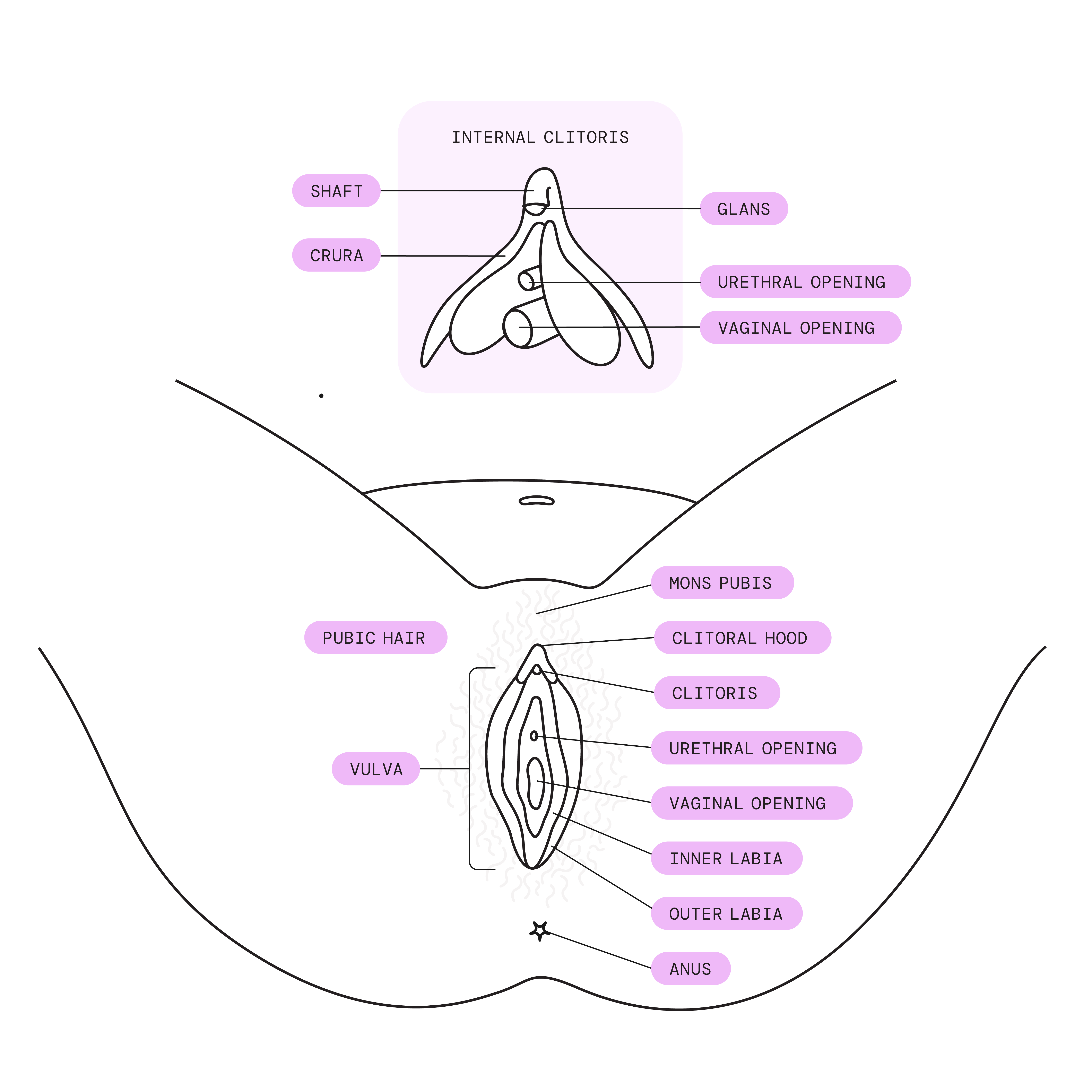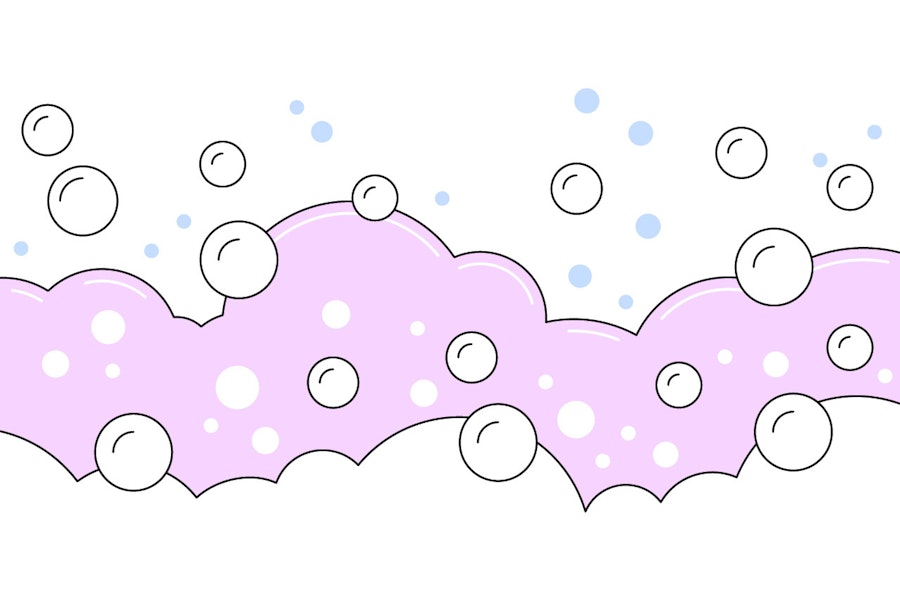How to clean your vagina and vulva
Follows NC° Editorial Policy
At Natural Cycles, our mission is to empower you with the knowledge you need to take charge of your health. At Cycle Matters, we create fact-checked, expert-written content that tackles these topics in a compassionate and accessible way. Read more...
Key Takeaways:
- Your vagina, the passageway inside your body between the vulva and the cervix, is self-cleaning and doesn’t need external intervention. Cleaning this internal area may actually lead to infection.
- Your vulva, the external area of the female genitalia, can be cleaned effectively by simply rinsing with warm water and/or using a gentle, perfume-free soap
- There are extra measures you can take to clean your vagina after your period or if you suspect something is wrong due to abnormal smell, discharge, or other symptoms
The vagina is the canal inside your body that leads from the external vulva to the cervix. The vulva is the external part of the genitalia that includes the clitoris, urethra, and labia.
This is an important distinction for the conversation around how to clean your vagina and vulva because the vaginal canal actually doesn’t need cleaning. This is a common misconception, and it’s important to know that the vagina is a self-cleaning environment. It generally does not need intervention from us to stay healthy and clean.
While you don’t need to clean your vagina, you can safely and effectively clean your vulva daily – simply rinsing with warm water usually does the trick. [1] Unfortunately, there are many myths about vaginal health and hygiene that overcomplicate this simple, proven cleansing method.
We’re here to dispel these myths while providing guidance on the best way to clean your vagina and vulva.

Do you really need to clean your vagina?
The short answer is no. The vagina is an ecosystem that thrives on its own. In fact, it has its own system of naturally flushing out dead cells and unnecessary microorganisms by producing discharge.
The vaginal ecosystem also has a delicate pH balance. The female sex hormone estrogen encourages the growth of bacteria called lactobacilli. These bacteria keep the environment slightly acidic, which naturally protects the vagina from harmful microorganisms. [2]
All of these systems work together to keep you clean and healthy without a second thought.
Some people are self-conscious about the way the vagina smells, which leads them to use external products to try to clean it. Remember – it’s normal for the vagina to have its own unique scent, ranging from coppery to tangy to sweet, and this scent doesn’t indicate that it’s dirty.
Introducing external products into this ecosystem can actually remove that good bacteria upset the pH balance, and lead to an increased risk of infection (and more unpleasant smells). [3]
How to clean your vulva
Although you don’t need to clean your vagina, it is a good idea to regularly clean your vulva. The good news is that there are safe and effective ways to do so. Practicing the following methods will contribute to a clean and healthy vulva.
What is the best way to clean your vulva?
- Warm water rinse: You can clean your vulva by simply rinsing the area with warm water during your daily shower. Be sure to gently lift the labia folds to make sure the entire external area is rinsed.
- Gentle, perfume-free soap: You may also choose to use soap on the vulva during your normal shower routine, carefully avoiding the internal vagina. It’s crucial to choose a soap that is unscented, gentle, and pH-sensitive. You may want to try a few brands until you find one that works for you, keeping an eye on how your body reacts to each one.
- Front to back: In addition to cleaning your vulva, it’s best to wash the perineal area, the area of skin between the vulva and the anus, and the anus every day.
Be sure to wash these areas front to back (meaning wash your vulva first, then the perineal area, then the anus) to avoid bacteria from the anus spreading to your vagina and vulva.
How to properly clean your vagina during your period
Your vagina will naturally keep itself clean at all points during your cycle, so even during your period, you do not need to clean the vagina, nor do you need to flush out menstrual blood. Doing so may cause more harm than good.
However, you should keep the external vulva, perineal area, and anus clean during your period. This can be done by using the methods mentioned above – front to back with a warm water rinse and/or perfume-free soap.
How often do you need to clean the vulva during your period?
Cleaning the vulva once daily during your normal shower routine is enough to keep your body healthy and clean during your period. If needed, you can clean the external area more than once a day, but there is no need for scented wipes or other perfumed products at any other time of the day (or ever).
Cleaning strategies to avoid
Now that we’ve outlined the safest methods of cleaning your vulva, let’s go through some common (and unfortunately popular) strategies for cleaning the vagina and vulva that should actually be avoided, as they can be harmful to your body.
Douching
Douching the vagina is a method that involves flushing water or soap into the vagina. Using the douche method to clean the vagina isn’t advised, as it can upset the vagina’s natural pH balance. A 2016 study also found that people who douched often were more likely to contract human papillomavirus. [4] Douching can upset the vagina’s natural pH balance as all types of bacteria (including the good kind) can be flushed out with this cleaning method.
Steaming
Vaginal steaming involves steeping various herbs in boiling water and then sitting over the hot water as the steam enters your vagina. There is no scientific evidence that this method is effective, and it can be harmful to the vulva by damaging the delicate skin tissue.
Scented products
Wellness brands have heavily marketed the idea that vaginas and vulvas should smell like flowers or be completely odorless for decades. This isn’t true. It’s a harmful myth that preys on our insecurities.
Embracing your natural scent can contribute to your overall physical, emotional, and mental well-being. Again, your body’s natural smell is an indication that things are working properly. It’s important to note that this scent may slightly fluctuate throughout the day or week due to factors such as exercise, diet, or hormonal changes during your cycle.
Adding external scented products (or products that claim to remove this smell altogether) like soaps, wipes, sprays, and perfumes can actually cause the opposite effect, drying out the skin and creating a vulnerable ecosystem with an increased risk for infection.
There is also a growing trend for the use of probiotics and boric acid suppositories (tablets that are placed directly in the vagina). If you are concerned about vaginal odors and are still interested in using a product to tackle this, it’s a good idea to talk to your doctor who may be able to recommend an option that’s kind to your vaginal health.
When to see a doctor
Odors associated with infections are much more pungent, distinct, and generally less pleasant than your natural scent.
If you notice extreme changes in odor that do not go away after a shower or within several days, talk to your healthcare professional as this may indicate an infection, especially if this change in smell is accompanied by symptoms such as:
- An itching or burning sensation
- Pain during sex or urination
- Blisters, sores, rash or discoloration around your genitalia
- Abnormally colored or textured discharge [3]
Ways to maintain good vaginal and vulvar hygiene
Aside from cleaning your vulva, there are certain lifestyle choices you can make to maintain good hygiene and avoid infection or other issues:
- Wipe front to back after you use the bathroom
- Avoid scented versions of tampons, pads, lubricants, and condoms
- Front-to-back applies to sexual activity as well – nothing that goes in or around the anus should touch the vulva or vagina without being cleaned first (including sex toys)
- Peeing after sex can naturally flush out bacteria to avoid infection
- Wear cotton underwear as often as possible as it is the most gentle and breathable fabric, this also absorbs discharge, reducing moistness that can lead to overgrowth of yeast and bad bacteria
- Change out of damp clothes or wet swimsuits as soon as possible to avoid a buildup of moisture (this can lead to bacteria overgrowth and infection)
- Choose pads or period underwear over tampons or menstrual cups if you are prone to vaginal infections, or are treating an infection while on your period
- Consider your birth control method carefully: if you are prone to infections you may want to avoid using certain types of contraception as these can increase the risk of infection
Learn about your body’s natural cycle
When it comes to an area as sensitive and nuanced as the female genitalia, keeping your routine plain and simple with warm water and maybe a gentle soap is the healthiest way to clean your vulva. Remember that your vagina, the internal passageway, does not need cleaning.
As with all reproductive health topics, the better you know your body, the more likely you are to notice changes as they happen. Natural Cycles is a temperature-based app that helps you learn the pattern of your unique cycle, it can be used as birth control or to plan a pregnancy. Along the way, you’ll also be able to track ovulation, cervical mucus, and more as they relate to vaginal and vulvar health.
Did you enjoy reading this article?
